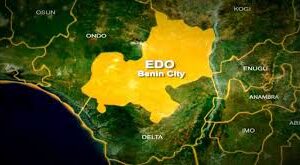The federal government has proposed to spend N13.08 trillion for 2021, which has a deficit of about N5.16 trillion. This is expected to be financed partly by borrowing. However, experts say, this would further worsens Nigeria’s debt situation; BENJAMIN UMUTEME reports.
When the coronavirus pandemic hit the global economy early in the year, many thought it will quickly went away, alas, it was not to be as six months down the line and still counting economies are yet to recover, even as many countries are planning on another round of lockdown.
Prior to that, Nigeria had been battling with depleting foreign exchange earning, due in part to falling oil price occasioned by market gloat and the Saudi-Russian price war.
The result was that government spending reduced significantly thus affecting the amount of things it could do for it’s citizens.
With the federal government unable to implement the 2020 budget due to covid-19, it had to revise the budget to a manageable level.
Signing the revised N10.80 trillion budget that was passed at the end of June in Abuja, President Muhammadu Buhari said the budget had to be revised because of the impact of coronavirus on the nation’s economy.
The new budget is also N211 billion higher than the N10.594 trillion passed by the legislature in December 2019 before it was revised to N10.509 trillion against the backdrop of the Covid-19 pandemic.
The budget allocated N422.77 billion for statutory transfers and N2.951 trillion for debt service and N2.9 trillion for sinking funds.
Out of the N2.951 trillion allocation for debt service, domestic debts got N1.873 trillion, foreign debts took N805.470 billion, and sinking fund to retire maturing loans is allocated N272.900 billion.
FEC approves 2021 budget proposal
In a bid to follow through on it’s promise on implementing a January-December budget circle, the federal government through the Federal Executive Council (FEC) approved the budget estimate of N13.08tn for the 2021 fiscal year.
According to documents, 29 per cent of the budget would be spent on capital expenditure while a deficit of N5.16 trillion would require financing partly by borrowing.
The federal government estimates it would generate revenue of N8.6 trillion in 2020.
The budget is predicated on the assumption that oil benchmark rice of $40 per barrel, oil production of 1.86 million bpd (incl. 400kbpd condensates), exchange rate – N379 to one, GDP growth at 3 per cent, and Inflation target at 11.95 per cent.
Rising debt
Since the sharp drop in prices of crude oil from over $100 in mid 2014, global oil prices has yet to get to the same level and in the height of the covid-19 pandemic, prices dropped into the negatives-meaning many countries including Nigeria did not earn foreign exchange for a couple of months as production was shutdown worldwide.
In the last couple of years, Nigeria’s debt has been rising steadily due to the government’s commitment to bridge the country’s infrastructure gap.
Data from the Debt Management Office (DMO) showed that Nigeria’s total public debt rose by N2.38 trillion to reach N31.01 trillion as at the end of June 2020. This is a huge rise in the amount the government borrowed pre-2015.
Rewind a little to Q1 2016, Nigeria’s debt profile was $19.16 trillion and by June 2020, it has risen to $27 billion by 2019.
However, the federal government is adamant that it would continue to borrow to fund it’s infrastructure.
Speaking to journalists recently during the inspection of the Lagos-Ibadan Standard Gauge Line, the minister of Transportation, Rotimi Amaechi and the Minister of Information and Culture, Lai Mohammed, assured that the loans it borrowed from China and other sources were being effectively utilised for infrastructure development that will create jobs.
They added that it would also provide the basis for economic development.
He said::“There is no better way to answer Nigerians as to what we have done with the money we have borrowed than this trip,” he told the over 40 journalists who accompanied them on the inspection.
“On this trip, you have seen first hand the stations being constructed, the rail lines and the people who are working on the projects.
“Rather than arguing with critics, we opted to allow you (journalists) – the ears and eyes of Nigerians – to come and see for yourselves what we are doing with the money we are borrowing.”
Justifying the loans, he said there was nothing wrong in borrowing provided the funds are invested in infrastructure rather than services or consumption.
“We didn’t borrow money for services or overhead expenditure. We borrowed money for capital projects: rail; roads; bridges; power – infrastructure generally,”
2021 budget and increased borrowing
In 2020, the government borrowed quite a substantial amount of money from the World Bank, the International Monetary Funds, the African Development Funds (AfDC), amongst other international multilateral institutes. All these were to cushion the effect of the covid-19 on the economy.
Analysts have expressed concerns on the country’s increasing debt. According to them, the country’s authorities are gradually signing away it’s future.
Data obtained from the DMO revealed that Nigeria spent $1.31 billion on debt servicing in 2019. This is about 86 per cent of the country’s foreign exchange earnings.
For the Lagos Chamber of Commerce and Industry (LCCI) Nigeria’s rising debt profile is a source for worry. Just as it cautioned the federal government to apply caution on the continued use of debt to meet fiscal obligations.
Nigerian states and the federal government recorded a total debt stock of N28.63 trillion in the first quarter of 2020, representing a 4.44 percent increase from N27.40 trillion in Q4 of 2019, according to data from the National Bureau of Statistics (NBS).
LCCI said Nigeria’s quest for borrowing would further pushed the country’s debt stock to N33 trillion by year-end (22 percent of GDP), a situation that would hurt the economy more.
The cash-strapped federal government has secured $3.4 billion and $288.5 million from the International Monetary Fund (IMF) and African Development Bank (AfDB) respectively, and it could secure another $1.5 billion from the World Bank-all in 2020.
The economic think tank, urged the fiscal authorities to explore the option of equity financing as it was a better and more sustainable strategy at this time the country was struggling to generate adequate revenue.
Echoing LCCI’s sentiments, Uche Uwaleke, Professor of the Capital Market said the N5.16 trillion deficit in the 2021 budget that would be financed through borrowing is worrisome.
According to Uwaleke, the implication is that the government will be borrowing to fund consumption.
“This is worrisome and so I expect the National Assembly to take a close look at these critical budget areas with a view to ensuring that the developmental aspects of the budget receive priority attention.”
Speaking with Blueprint Weeknd on Friday in Lagos, Country Coordinator of Nigeria National Resource Centre (NNRC), Tengo George-Ikoli, lamented the ways the country’s debt was piling up.
“How do you spend 86 per cent of your earning on debt servicing. The have accumulated so much and they don’t seem to act like like people are in a precarious situation,” she said.
For his part, finance and oil and gas industry expert, Henry Adigun said “the budget preparation process is a comedy. A lot of government people who plan budget do not understand what they churn out,” he told our reporter.



